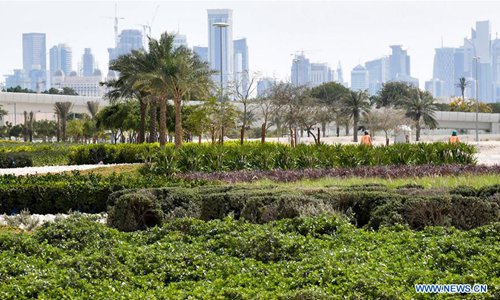HOME >> ODD
Feeling blue: Qatar road turned azure to cool city
Source:AFP Published: 2019/9/10 19:13:40

Photo taken on Aug. 27, 2019 shows a view of the newly developed Lusail city, 20 kilometres north of Doha, capital of Qatar. The country is making efforts to promote the green development concept in its urban planning and construction. (Photo: Nikku/Xinhua)
Temperatures in the desert emirate sometimes reach 50 C and heat was a major concern when the country was named as host of the 2022 World Cup.
While the tournament will be hosted in the cooler winter months to avoid the hottest period, Doha still grapples with stifling conditions in the summer.
High temperatures can cause car dashboards to crack, paintwork to discolor and plastic trim to melt - encouraging authorities to look for innovative solutions.
A 200-meter stretch of a downtown thoroughfare leading to the waterfront has been coated with a one millimeter thick blue heat-reflective pigment.
Over an 18-month trial period Qatar's public works authority will test if the new surface effectively brings down the temperature and helps reduce heat in the area around the coated road.
"We do have an environment where there are higher temperatures that occur in the surrounding hinterland and obviously that is uncomfortable," said Alex Amato, head of sustainability at the Qatar Green Building Council.
It is hoped that Doha's eye-catching blue surfaces will absorb less solar radiation and reflect ultra-violet rays, reducing the local temperature for passing pedestrians and motorists.
A digital display alongside the Doha experiment showed the traditional surface was between six and 10 degrees hotter than the covered roadway.
"Maybe we can't alleviate the temperature throughout the whole of the year, but certainly we can extend that period when people can use those external spaces," Amato said to the media.
AFP
Posted in: WORLD